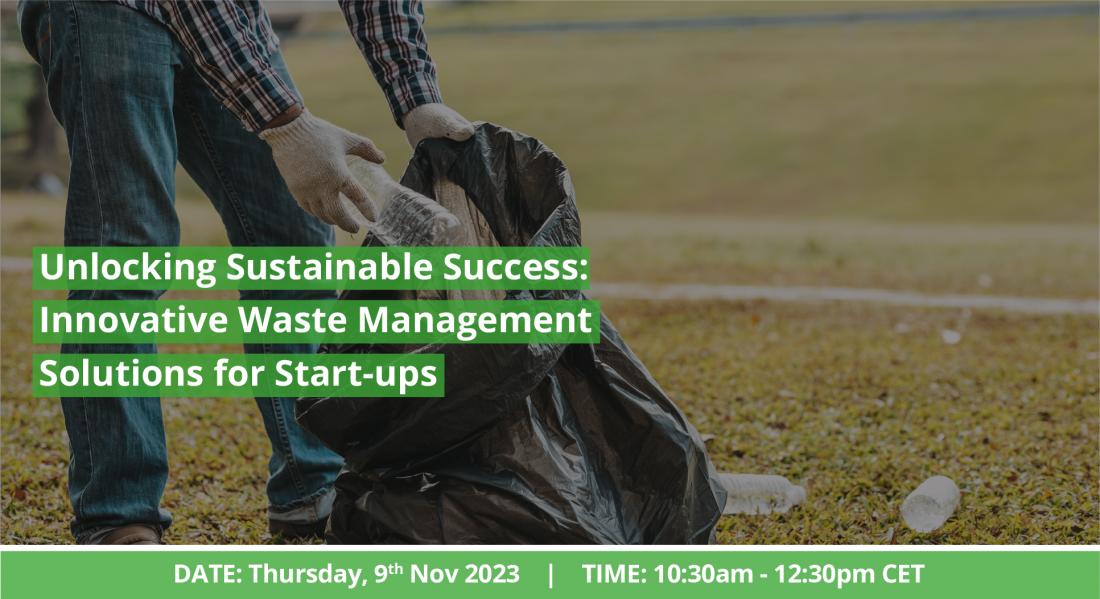Med4Waste project shares recommendations, insights, and innovative waste management solutions during its recent webinar

Med4Waste held a webinar on the 11th November 2023 on innovative waste management solutions as part of the Med4Waste capitalised project awareness-raising campaigns. The webinar titled "Unlocking Sustainable Success: Innovative Waste Management Solutions for Start-ups" was hosted by EDAMA, the Jordanian partner and joined by other partners, including BETA and BusinessMed, along with other projects funded under ENI CBC MED programme and part of the Med4Waste capitalised project.
The event kicked off with a presentation by Aleix Sanchez, Med4Waste project manager, where he shared a video on the main achievements throughout the Med4Waste project. Following his presentation, Lama Nehme shared the impactful work of Arcenciel, a non-profit NGO uplifting Lebanon's marginalised community. She also highlighted Arcenciel's experience with the CLIMA project, another project funded under ENI CBC Med programme.
Ms. Takwa Mrabet guided the audience through the innovative realm of regional economic empowerment with BUSINESSMED's Business Country Disk (BCD), a platform fostering networks and strategic partnerships. Followed by Mr. Guglielmo Mazzà articulating the transformative journey of ReFuse, a local social enterprise committed to cultivating a zero-waste Lebanon.
Eng. Buthaina Aburoza then walked the audience through the progress made by Qutoof Professional Development, a non-profit organisation dedicated to excellence and sustainability in Jordan. On the Tunisian side, Mohamed Boussoffara shares the Municipality of Mahdia in Tunisia's achievements, which contributed significantly to local prosperity under CLIMA project grants.

At the conclusion of the webinar, a survey was introduced to gather data on three critical aspects. These aspects were identified based on the common challenges discussed by both the speakers and participants throughout the webinar. The challenges encompassed the following:
1. Insights and ideas for Emerging Enterprises.
- Embrace data-driven decision-making: Utilise sensors and data analytics for real-time monitoring, enabling efficient planning and resource allocation.
- Deploy smart bin technology: Equip bins with sensors to optimise collection routes, preventing overflows and reducing environmental hazards.
- Invest in waste sorting and recycling automation: Incorporate automation and robotics for improved sorting accuracy, leading to higher recycling rates and reduced landfill waste.
- Emphasise circular economy principles: Minimise waste by adopting circular economy models that prioritise resource reuse, recycling, and repurposing.
- Engage communities through digital platforms: Utilise mobile apps and digital platforms to engage communities, promoting responsible waste disposal practices and increasing recycling rates.
2. Primary challenges faced by waste management startup.
- Legal framework: Navigate complex waste management regulations.
- Technological integration: Incorporate data-driven decision-making and automation.
- Market education: Convince customers to adopt new technologies.
- Trust building: Establish credibility with stakeholders, and awareness raising.
- Environmental impact: Demonstrate positive sustainability effects.
- Customer acquisition: Tailor marketing for the initial customer base.
- Scaling operations: Balance efficiency while maintaining quality.
- Community engagement: Manage public perception and engage local communities.
3. Key strategies for effective waste management policies.
- Legislation and regulation: Establish clear and adaptable waste management regulations covering collection, sorting, recycling, disposal, and reporting. Ensure policies can evolve with changing waste streams and technologies.
- Multi-stakeholder collaboration: Engage diverse stakeholders, including government agencies, industry representatives, environmental organizations, community groups, and waste management experts, fostering collaboration and shared responsibility.
- Flexibility and adaptability: Recognize the need for flexible policies that can address emerging challenges, integrate new technologies, and adapt to changing waste streams.
Watch the full webinar here.
The agenda and the presentation here.









